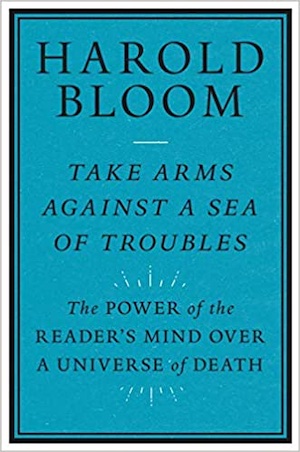By D.T. Siebert
Harold Bloom’s recent and final book is hardly standard literary criticism. It features a brilliant critic and teacher delivering a series of last lectures—what indeed might be called his swan song.
Bloom (ΦBK, Cornell University) was the author of an impressive ouevre of provocative books and essays. He was also an inspiring teacher and mentor for many years at Yale. He championed (and champions, in this book) the old school of what he calls “high literature,” by which he means an elite canon, including Shakespeare, Milton, Wordsworth, Shelley, Keats, Browning, Blake, Yeats; and Americans Walt Whitman, Robert Frost, Wallace Stevens, Hart Crane, and others; plus the Judaic and Christian canon; and even Sigmund Freud.
This book was composed during the last few years of Bloom’s life—indeed some of it apparently written while he was hospitalized for fatal health conditions. Some of Bloom’s comments on poetry and life reflect that near-death awareness. By and large, this book powerfully reflects Bloom’s lifelong love of poetry and his emotional responses to that poetry. It also features Bloom recounting conversations with some of the literary cynosures of the past 60 years or so.
Bloom’s book is rambling, organized only by the chapter headings featuring his favorite authors. Sometimes chapter headings can be misleading. The chapter “Shelley and Byron” says scarcely a word about Byron. Still, the effusion of admiration for Shelley, Bloom’s doctoral dissertation subject, is worth the slight to Byron. Byron was likely too satirical and playful a poet for Bloom.
Bloom’s literary memory was apparently prodigious. He remembers his recourse to many long passages of poetry while trying to sleep at night. Here is one: “I have Shakespeare all but committed to memory, while the Commedia [by Dante] is still strange to me, no matter how many times I read through it. In my exhausted midnights, when I think about the two poets in visual images, the effect is like the shock of comparing Caravaggio to Giotto.” There are many such passages reflecting Bloom’s deep, emotional response to poetry’s power. One might even title his book “Bloom Agonistes.”
Regarding Bloom’s fabled literary memory, one of many legends is that a student at Yale might intercept him as he was walking to his office. The student might recite several lines of Milton’s Paradise Lost—an epic poem of thousands of lines. Bloom would then continue walking, reciting the verses that follow the prompt. Samuel Johnson once scoffed at such tales of preternatural memory—such as one claiming Milton had the whole Bible memorized, part in Hebrew and the other in Greek, and certainly the great King James Version (1611) in English. Well, who can know? In Bloom’s case, I’m inclined to believe much of the legend.
The book’s title and subtitle, taken appropriately from Shakespeare and Milton, certainly suggest that the book will help readers fortify themselves against the fear of death. My own book Mortality’s Muse: The Fine Art of Dying (2013) more specifically mounts such an argument. Nonetheless, Bloom’s brilliant and quite emotional responses to his long quotations are empirical proof of poetry’s power—certainly for this one man. And of course, all great poetry and art are inspired by the shadow of mortality. As Wallace Stevens observed, paradoxically, twice in his great poem “Sunday Morning”— “Death is the mother of art.”
D.T. Siebert (ΦBK, University of Oklahoma) is distinguished professor emeritus at the University of South Carolina.




